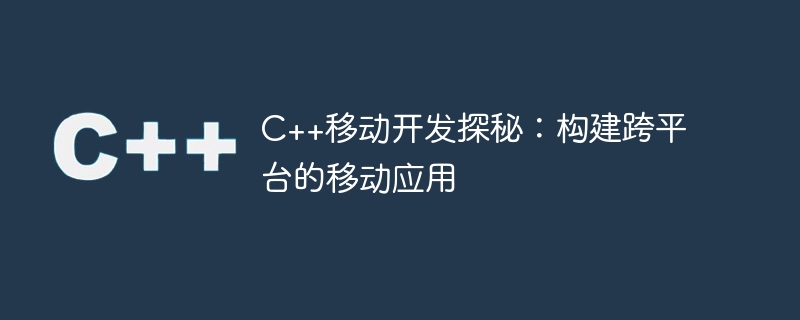Home >Backend Development >C++ >Exploring C++ Mobile Development: Building Cross-Platform Mobile Apps
Exploring C++ Mobile Development: Building Cross-Platform Mobile Apps
- 王林Original
- 2023-11-27 10:43:461571browse

C Exploring Mobile Development: Building Cross-Platform Mobile Applications
With the popularity of mobile applications, cross-platform development has become an important topic. Developers want to be able to develop apps on different mobile operating systems without having to write different code for each platform. This leads to a new development method-cross-platform development.
In cross-platform development, C language has gradually become the first choice for developers. C has many advantages such as high performance, efficiency, reliability and portability, making it an ideal cross-platform development language. This article will explore the application and development of C in mobile development.
There are two main ways to develop cross-platform mobile applications: Web applications and native applications. Web applications are built using web technologies such as HTML, CSS, and JavaScript and can run on multiple platforms, but are limited by the performance and functionality of the browser. Native applications are closely related to specific mobile platforms and can directly call functions and interfaces provided by the operating system to provide better performance and user experience.
C There are two important frameworks in cross-platform mobile application development: Qt and Unity. Qt is an object-oriented cross-platform development framework that can help developers quickly build high-performance mobile applications. Qt provides a rich set of classes and methods that support multiple mobile platforms, including Android and iOS. Developers can use C to write application logic and use Qt to implement interfaces and functions.
Unity is a widely used cross-platform game engine that can also be used for mobile application development. Unity uses C as the underlying language, and developers can use the Unity Editor to create scenes, add objects, and apply physical effects. Unity can publish apps to multiple platforms, including Android, iOS, and Windows Phone.
In addition to Qt and Unity, there are many other C frameworks and tools available for mobile app development. For example, Cocos2d-x is a popular game development framework written in C. React Native is a mobile application development framework launched by Facebook that can use C to write some high-performance modules.
Of course, mobile development in C is not without its challenges. C has a steep learning curve compared to other languages. The C language itself is relatively complex and requires developers to have certain programming knowledge. In addition, different mobile platforms also have different levels of support for C, and developers need to understand the features and limitations of different platforms.
However, the advantages of C still make it the best choice for mobile development. C's high performance and reliability allow developers to build complex and efficient mobile applications. C's portability allows applications to easily run on multiple platforms, reducing development and maintenance efforts.
To summarize, by using C language, developers can build cross-platform mobile applications. C offers many advantages such as high performance, efficiency, reliability, and portability, making it an ideal cross-platform development language. In mobile development, Qt and Unity are two important C frameworks that can help developers quickly build high-performance mobile applications. Although C has a steep learning curve, its advantages make it an obvious choice for mobile development.
It can be seen that C has broad application prospects in mobile development and can help developers build cross-platform, high-performance mobile applications. In the future, we can expect more innovations and advancements to provide a better mobile app experience.
The above is the detailed content of Exploring C++ Mobile Development: Building Cross-Platform Mobile Apps. For more information, please follow other related articles on the PHP Chinese website!

